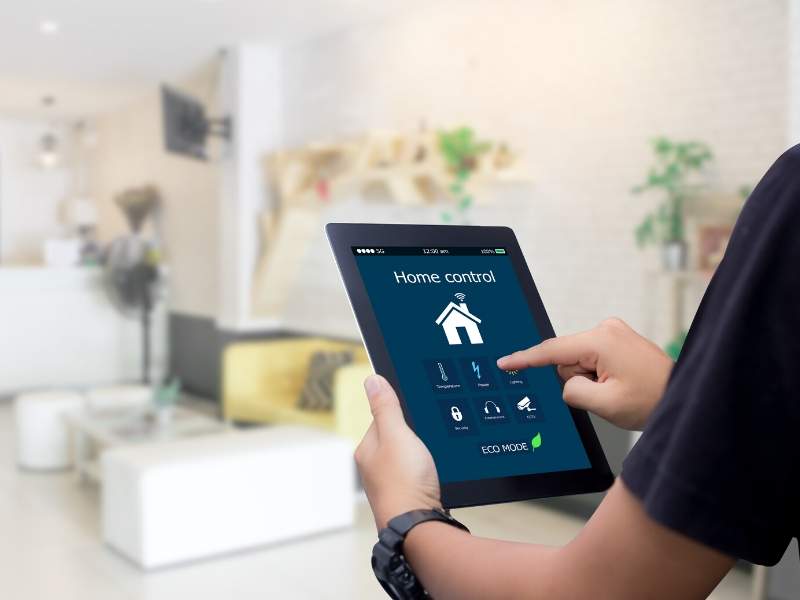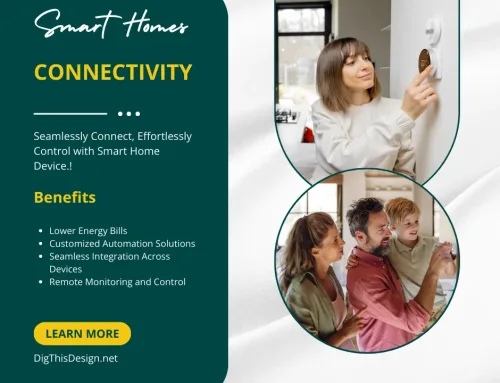We live in a world dripping with technology. In every industry and at every turn, there is digital technology, Wi-Fi, the cloud – and I don’t mean the ones in the sky. Technology is something that has evolved so much in the past few decades that we can no longer get away from it. And why would you want to? It’s down to technology that you are even reading this blog post. Your internet connection, your laptop or tablet or smartphone all exist because of digital innovation – and aren’t we all lucky enough to experience that? In your personal and professional life, you are immersed in all things digital, so it’s no surprise that companies and innovators have come up with smart home technology to make our lives easier.
Smart Home Technology, The Pros & Cons

You Need Connectivity
A century or so ago, people would balk at the idea of having electricity in the home; candles and fires had done well enough until that point, so why fix what wasn’t broken? Well, nothing changes! We still live in a world where people are seeking improvement in what we have. Electricity thankfully did make a breakthrough in the houses of those who were rich enough to afford it, and then it filtered down to streetlights and then onto homes of regular folk.
Digital development and innovation then led to appliances like the television and refrigerator being created, and then the freezer. Being able to use a refrigerator instead of a larder has changed the way we prepare and store food, making our lives easier – and that’s thanks to technology for the home. Washing machines, dryers, ovens; we’ve evolved and moved on now to the point that even our appliances have touch screens and voice control and they are connected to our internet services at home.
Having a great service from companies like Optimum is the only way that all our appliances and home security systems can be accessed easily. Embracing the Internet of things means that you have to connect as many of your home devices as possible to the internet, no matter who serves as your internet provider. This allows for synchronicity and management of your appliances and home at the touch of a button. Nifty, right?
What If Wi-Fi World Wide Went Down?
Well, maybe. For some, a smart home is not the answer. While it makes for an easy life, a smart home does come with disadvantages. The idea of a smart home is nothing short of convenient. Let’s be honest here, if you could schedule your washing to come on at a certain time of day and all you had to do was click a button, it would be convenient, right?
However, there are some things that aren’t so wonderful about being so heavily reliant on technology, though. For example, children of today are more familiar with technology and tablets than we were back in the 1980s, and questions are rising up about the state of the children’s handwriting and whether this is due to the overuse of technology and tablets. It wouldn’t be a surprise; constantly tapping a screen means that the hand loses muscle memory, which is important for handwriting.
Being so reliant on technology also means that if one day, a switch was flipped, and Wi-Fi worldwide went down, there would be chaos. Electric cars would stop working, businesses would stop running in the same way and there would be huge security breaches. In the home, there is a chance that by raising the standards of your own comfort, you are putting your privacy at risk.
Let’s be very clear here; technology is awesome. Being online and able to communicate with whomever you want across the world at the touch of a button? That is an amazing concept in life. The world is a very different place in a positive way because of technology. Every single opinion has an opposite, so for every advantage of smart technology in the home, there is a disadvantage. Exploring the disadvantages is just as important as understanding the positives; this is your home, your choice, and your decision as to whether you go Jetson on it and get it upgraded into a home controlled by touch.
Consider Cost
Having a smart home can be expensive. Transforming your home into a smart one isn’t necessarily going to be a cheap venture. First, buy appliances that are compatible with your new smart tech, change out devices, switches, plugs, and even your lighting. Also, introduce climate control, security systems that you activate with an app on your smartphone. You can tune into your house from your workplace to check on your CCTV and even be notified when someone rings your doorbell.
These things cost a lot of cash and this is only just the beginning. A smart home has an initial cost for everything that you install, but you also have to factor in the maintenance cost of a smart home. Think about it this way: you need to continue the upkeep on your car and consider how you keep it upgraded and fixed. Well, you’d have to do the same with your house. Appliances that are digital and integrated are often more expensive to fix, too, so that’s another expense that you would have to think about.
Compatibility Issues
One of the more frustrating disadvantages of a home that is far too smart is the fact that you have to make sure all your appliances, switches and plugs all get along. Technology needs to work together to be worthwhile for your home, and not all technology is created by the same company. Apple, Samsung, Amazon – they are all creating different smart technologies, so trying to sync these together can be fairly time-consuming as they all work in different ways. The more smart devices that you have in your home, the more apps your tablet or smartphone will need and the more care you will need to take to ensure that there are no breakdowns and fixes to be made.
Security Risks
Installing digital tech all around the home, including the baby’s room, can make you and your family rather vulnerable. Thieves and burglars who go into homes through the back door or by popping out a window are able to upgrade themselves to digital thieves, hacking your technology and finding out the vulnerable areas of the home that way. The data that the digital devices in the house have are then open to theft and attack, leaving you powerless.
Imagine having your doors and windows digitally controlled, but your home security system gets hacked and you cannot even get into your own house? Problems like this are likely not going to be common ones, but when you have children in the home, the last thing that you need is a breach in this manner. It can be very unstable when you have a house run by technology because it just takes one person to crack a code and you are locked out, locked down and powerless to do anything about it.
Privacy Breach

I don’t mean people jumping into your systems and spying on you, though this is a very real threat, all the devices and apps that you have on your tablet and in your house have data links. For every app that you download, you have to input your personal details. This means that your devices will be serving those who power them rather than you. Data sharing means that the data that is gathered from your home and the people who live in it is given to companies that use data for financial gain, something to think about.
These are the general disadvantages of a smart home, but for each of these disadvantages, there are amazing benefits. The security that you can receive from the systems in place can really make you feel secure, especially because the risk of a breach is fairly low at the moment. You can use smart technology to communicate with the kids at home from wherever you are, which means you don’t have to feel too far away no matter where you are in the world.
There are also smart technology developments that are great for the environment and the wallet; smart shower systems and the use of electric cars as mentioned earlier. These are great for the wider world and the smart tech in the home can boost self-sufficiency, especially in the elderly or the less able. Voice commands with appliances can mean that those who are unable to move as much are still able to maintain independence and dignity.
In the end, all that matters is how you feel about home technology. Only you can know whether your home is far too smart. Some families want to soup up their homes as much as they can, while others want their inanimate objects to stay as dumbed down as possible. You don’t have to be up for a talking refrigerator to want a home filled with smart technology.
I love the new technological world we live in, but it comes with a learning curve. You just want to be smart in selecting the technology that actually simplifies your life and doesn’t add friction!
Images Courtesy of Canva.
Other posts you might enjoy:
Get Your Geek On with Smart Home Technolgy
Smart Home Technology You Need in Your Home design
Reducing Energy Costs The “Smart” Way with Smart Home Technolgy





